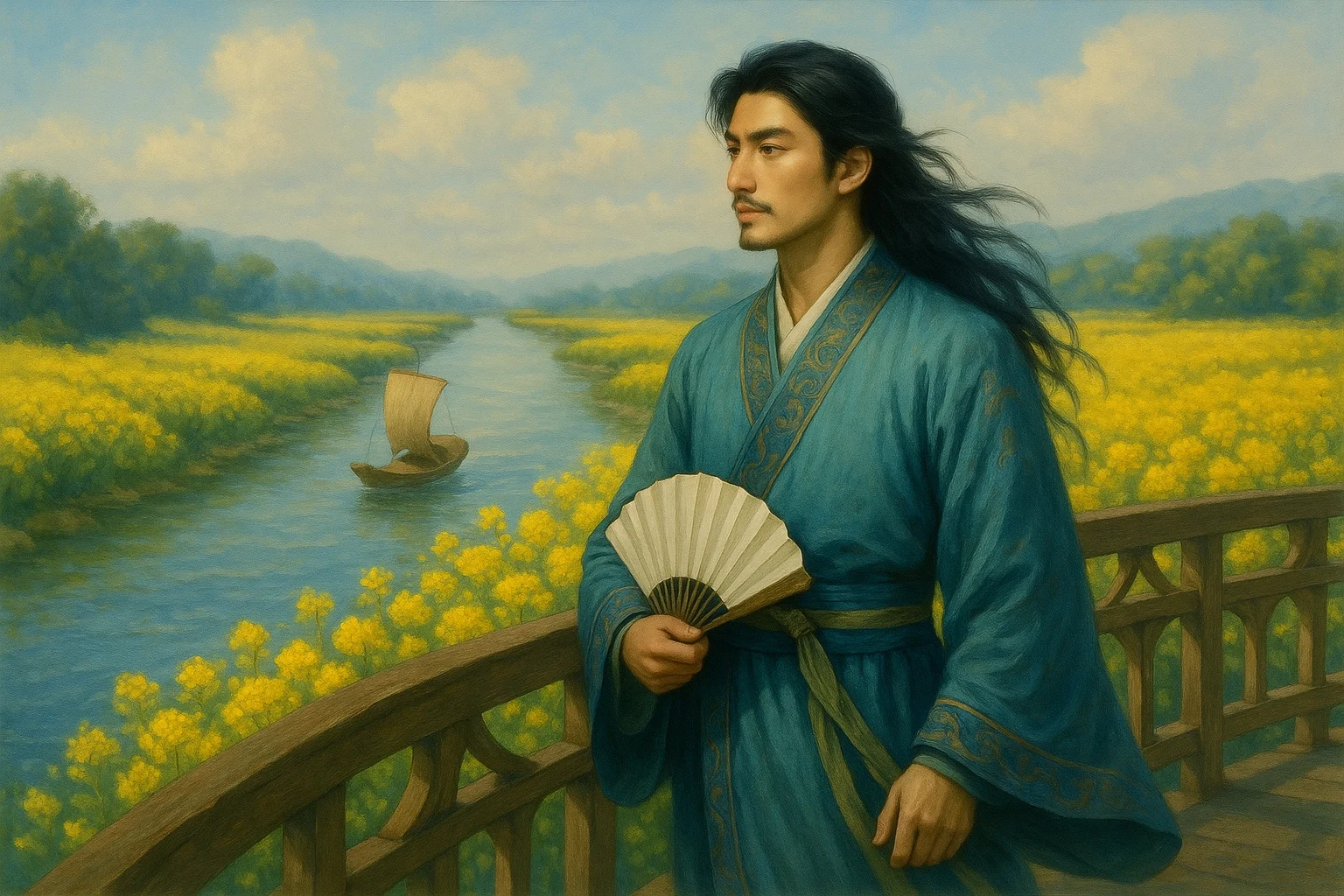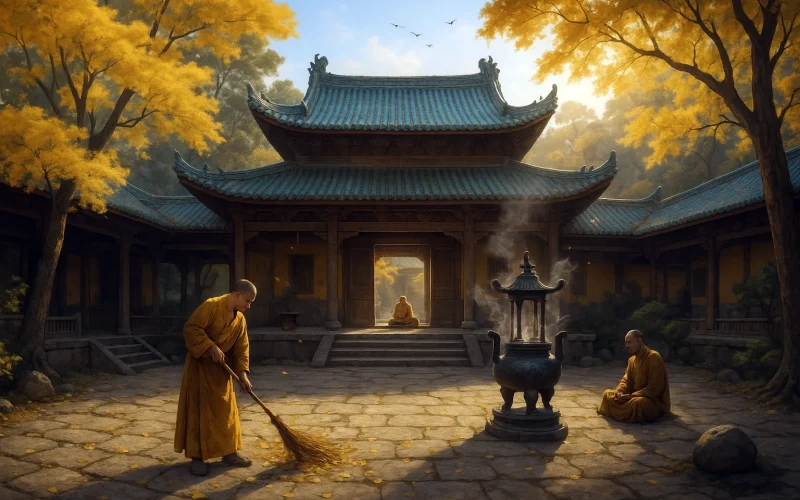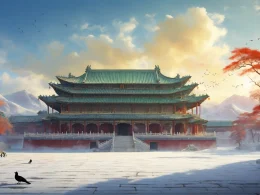Long have I roved through cloud-wrapped woods,
Thus grown a man of idle moods.
Clerks mock my governance as vain,
My wife laughs at our purse’s strain.
Li and Guo shine with timely grace,
Wang and Yang join the court’s embrace.
At leisure in the Minister’s hall,
Do you recall our hometown spring—its all?
Original Poem
「书怀寄杨郭李王判官」
崔峒
惯作云林客,因成懒漫人。
吏欺从政拙,妻笑理家贫。
李郭应时望,王杨入幕频。
从容丞相阁,知忆故园春。
Interpretation
This poem was composed during the mid-to-late Tang Dynasty by Cui Dong, who found himself adrift in the uncertainties of officialdom. Through Reflections Penned to Judges Yang, Guo, Li, and Wang, he conveys his frustration over unrecognized talent and thwarted ambitions, while also expressing tender nostalgia and hope toward old friendships. Yang, Guo, Li, and Wang—all serving as judges in the court—were either close friends or former acquaintances. The poet uses this verse to voice his longing for them and his hope that they might remember him despite his obscurity. Beginning with self-revelation, the poem traverses the hardships of bureaucratic life and domestic poverty, culminating in affectionate thoughts of his friends—its emotions raw, its language candid.
First Couplet: "惯作云林客,因成懒漫人。"
Guàn zuò yún lín kè, yīn chéng lǎn màn rén.
Long a wanderer 'mid clouds and woods,
I’ve grown a man of idle moods.
The opening lines establish self-identity: the poet attributes his unconventional, unhurried nature to years of reclusion (clouds and woods). This confession foreshadows his lack of career advancement, framing his "idleness" as both a choice and a consequence of disengagement from worldly pursuits.
Second Couplet: "吏欺从政拙,妻笑理家贫。"
Lǐ qī cóng zhèng zhuō, qī xiào lǐ jiā pín.
Clerks mock my bungling governance;
My wife laughs at our indigence.
Here, self-deprecation blends with helplessness. The poet lays bare dual humiliations—professional incompetence (bungling governance) and domestic poverty (indigence). The parallel ridicule from clerks (lower officials) and wife sharpens his isolation, tinged with irony and sorrow.
Third Couplet: "李郭应时望,王杨入幕频。"
Lǐ Guō yīng shí wàng, Wáng Yáng rù mù pín.
Li and Guo command esteem today;
Wang and Yang are summoned to sway.
The poet contrasts his obscurity with his friends’ success. Li and Guo shine as luminaries of their age, while Wang and Yang are frequently recruited (summoned to sway) into influential posts. The juxtaposition underscores his lingering attachment to their shared past, now diverged into unequal fates—a quiet envy veiled in congratulation.
Fourth Couplet: "从容丞相阁,知忆故园春。"
Cóng róng chéngxiàng gé, zhī yì gù yuán chūn.
At ease in the ministers’ halls,
You’ll recall spring in our old walls.
The closing lines shift to tender assurance. Though his friends now move at ease in power’s inner circles (ministers’ halls), the poet trusts they’ll remember spring—a metaphor for their youthful camaraderie and his enduring presence. The plea, gentle yet poignant, reveals his sole solace: friendship’s constancy amid life’s reversals.
Holistic Appreciation
The poem unfolds with richly layered emotions, its tone unadorned yet dignified. From describing his reclusive nature to lamenting his lack of official success and family hardships, the poet candidly reveals his struggles and the bitterness of unrecognized talent. Yet he does not vent grievances; instead, he naturally shifts focus to the achievements of old friends, using contrast to highlight his own detachment and solitary grace. The closing line, "leisurely in the minister's pavilion," carries an implicit message: even if he himself remains unfulfilled, he wishes his friends well and trusts they will not forget their shared past. This stance—aloof yet warm, proud yet deeply affectionate—is profoundly moving.
Artistic Merits
The poem’s language is concise and distilled, straightforward yet profound. It employs contrast between "I" and "you" to intensify emotional resonance. The poet deftly interweaves three themes—official life, family circumstances, and friendship—moving from personal reflection to broader social context, creating a work that resonates as both a "remembrance of others and meditation on self." Phrases like "wanderer of clouded woods," "clumsy in governance," and "minister's pavilion" delineate distinct identities, lending authenticity to the emotions and elevating the poem’s thematic scope.
Insights
This poem reveals a scholar’s introspection and composure in adversity. Rather than blaming fate for his stalled career, he faces reality with candor and magnanimity, expressing nostalgia for friends and steadfast belief in his own worth. It reminds us that even in life’s low points, one can preserve sincerity, integrity, and self-awareness—and trust that the warmth of friendship and the soul endures, no matter how far apart we may be.
About the Poet

Cui Dong (崔峒, dates of birth and death unknown), a Tang Dynasty poet from Anping, Hebei, was active during the Dali era (766 - 779). Along with Sikong Shu, Lu Lun and others, he was known as one of the "Ten Talents of Dali." His poetry primarily consists of five-character regulated verse (wulü), characterized by an elegant and subtle style. The Complete Tang Poems preserves 48 of his works. His poetic style resembles Liu Changqing's but appears more solitary and austere, reflecting the transition from the vigorous grandeur of High Tang poetry to the introspective quality of Dali-era verse.












